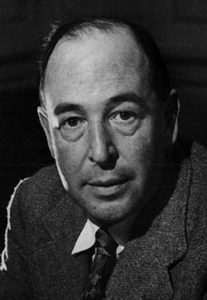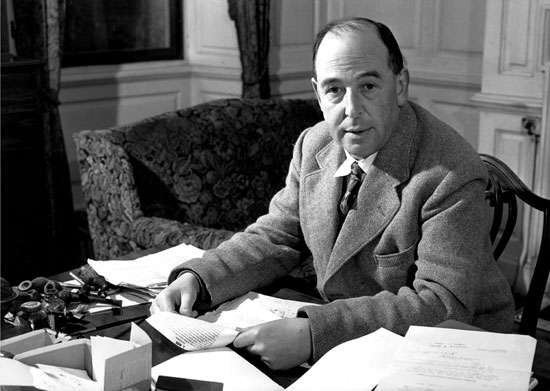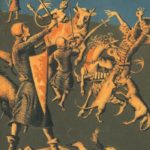C. S. Lewis Fifty-five Years Later
The week of the fiftieth commemoration of the day C. S. Lewis died, I used the occasion to write about his influence in relation to the other famous men who also died that same day. That was five years ago!
Now we are approaching the next milestone of remembrance, the fifty-fifth year since his death. I’m not sure why, but no one stands out to me as a better example of Christian writing. I like Tolkien’s stories better and some of the contemporary apologists better. But Lewis had a breadth that others lack. He had both a simplicity and a grasp of complex arguments. He painted memorable pictures with words. He took the profound and made them live. Consequently, I’m happy to run this article and quiz again as my tribute to the man and what he has meant to me.
And the quiz? More to stimulate thought and discussion than anything. Have fun with it.
Five years ago this November, the media began their expected tribute to President John F. Kennedy who was assassinated November 22, 1963. Two other famous men died that same day—both writers. The one was Aldous Huxley and the other, C. S. Lewis.
I’ve asked the question over the years, which of the three will history remember as having had the greater impact? Of course, that’s the kind of thing no one can truly quantify. But as much talk as there is this week about President Kennedy and how “everything changed” after he was killed, I don’t recall a great deal of discussion about his ideas or influence over the past ten years. Some.
Often politicians invoke President Kennedy’s memory as part of their election campaigns and the media will mention “Camelot” in wistful tones or Marilyn Monroe’s birthday song to him with knowing winks. And of course there are the conspiracy theory discussions. But President Kennedy’s influence?
 Aldous Huxley, author of Brave New World, has fostered even less discussion though his dystopian fiction fits in quite nicely with the high profile young adult dystopians of the past few years. He also embraced such ideas as Universalism, pacifism, mysticism, and “Vivekananda’s Neo-Vedanta” or Neo-Hinduism which has seeped into mainline western thought.
Aldous Huxley, author of Brave New World, has fostered even less discussion though his dystopian fiction fits in quite nicely with the high profile young adult dystopians of the past few years. He also embraced such ideas as Universalism, pacifism, mysticism, and “Vivekananda’s Neo-Vedanta” or Neo-Hinduism which has seeped into mainline western thought.
I certainly don’t want to take anything away from the impact that President Kennedy or Aldous Huxley had, but C. S. Lewis’s legacy seems to grow year after year.
Though the subject of their admiration was, among other things, an Oxford scholar, a literary critic, a poet, a writer of more than 30 books and countless shorter pieces and speeches, a war veteran, and even a broadcaster, to many it is Lewis’ contributions as a masterful Christian apologist that most endears him to readers and endures a half-century after his death. He made the complex simple and the brain-bending breezy. An estimated 200 million copies of his books are in print, and today they continue to sell about 2 million copies annually. (“C.S. Lewis: Even 50 years after death, his work deeply inspires,” Christian Science Monitor, emphasis added)
Chicago Tribune columnist Cal Thomas has weighed in on the question, and he sizes up the influence of these men the same way I do:
Of the three, it was Lewis who not only was the most influential of his time, but whose reach extends to these times and likely beyond. His many books continue to sell and the number of people whose lives have been changed by his writing expands each year. (“Kennedy, Huxley and Lewis”)
 Certainly the Narnia movies, though a disappointment to true C. S. Lewis fans, sparked a renewed interest in Lewis’s fiction, but his reputation has never stood upon his storytelling alone. I personally have loved his fiction most, but I appreciate his non-fiction greatly.
Certainly the Narnia movies, though a disappointment to true C. S. Lewis fans, sparked a renewed interest in Lewis’s fiction, but his reputation has never stood upon his storytelling alone. I personally have loved his fiction most, but I appreciate his non-fiction greatly.
Of his works, my favorites are Till We Have Faces; The Great Divorce; The Lion, the Witch, and the Wardrobe; The Last Battle; Screwtape Letters; Surprised by Joy. Of those, only the last is non-fiction.
By today’s style of writing, Lewis’s fiction fails miserably. He writes in the omniscient point of view, uses far too many adverbs, and tells more than he shows. Yet his stories resonate with truth, and consequently they stick. In fact, for me, they have revolutionized my understanding.
I came to see my relationship with God in a different way after reading about Aslan and his relationship with the kings and queens of Narnia. I grasped the reality of heaven like I never had before after reading The Great Divorce, and I recognized the way temptation draws me away from God upon reading The Screwtape Letters. Mostly I apprehended to a greater degree God’s love and sacrifice and demand for our surrender to His way.
And of course, Lewis showed me what a writer could do with fiction. He made me want to put truth in stories so that readers would grasp profound realities because of a simple line (E.g., the overly used but nonetheless profound quote from The Lion, the Witch, and the Wardrobe: “Safe?” said Mr. Beaver […] “Who said anything about safe? ‘Course he isn’t safe. But he’s good. He’s the King, I tell you.” [excerpt from Ch. 8: “What Happened after Dinner”]).
Noted scholar Clyde Kilby concluded his book Images of Salvation in the Fiction of C. S. Lewis with an insightful observation about the truth Lewis made pivotal in his stories:
throughout all of Lewis’s Christian works we find a great difference in eyesight—or better, spirit-sight—between the saved and the unsaved. How very blind poor Orual was, and that for most of a lifetime. How well Psyche saw, even from early childhood. How clearly Lucy Pevensie saw always, and how blind was her sister Susan, even in the very presence of Aslan. How blind were all but one of the passengers on the bus from hell to heaven. How eternally clear sighted was the Green Lady and how myopic Weston. How often blind are the so-called great in any age and how seeing the humble and quiet of spirit. Lewis’s insight into this difference between sight and blindness is no less explicit than that presented in the Bible itself.
Even his poetry is filled with these themes. Here’s a sonnet of his centered on this truth:
The Bible says Sennacherib’s campaign was spoiled
By angels: in Herodotus it says, by mice–
Innumerably nibbling all one night they toiled
To eat his bowstrings piecemeal as warm wind eats ice.But muscular archangels, I suggest, employed
Seven little jaws at labour on each slender string,
And by their aid, weak masters though they be, destroyed
The smiling-lipped Assyrian, cruel-bearded king.No stranger that omnipotence should choose to need
Small helps than great–no stranger if His action lingers
Till men have prayed, and suffers their weak prayers indeed
To move as very muscles His delaying fingers,Who, in His longanimity and love for our
Small dignities, enfeebles, for a time, His power.(from Poems, C. S. Lewis, edited by Walter Hooper)
Just for fun quiz:
- Which of Lewis’s books did he dedicate to J. R. R. Tolkien?
- To whom was Screwtape writing?
- Which of Lewis’s books is his spiritual autobiography?
- In the quote above from Dr. Kilby, he points out Lewis’s use of sight as a metaphor for spiritual understanding. Name at least one other character besides Susan from the Narnia books who suffers from blindness to Aslan’s reality.
- How different do you think Lewis’s fiction would be if he had never become a Christian?
Feel free to leave your answers in the comments below. 😉
What impact has C. S. Lewis had on you as a reader or as a writer? Are you more familiar with his fiction or nonfiction? Which books are your favorites? Have you read his poetry?










































Ok, totally from memory and no cheating:
1. I don’t remember. ‘Till We Have Faces, maybe?
2. His nephew, what-his-(ugly)-face. Was it wormtongue? (I don’t quite remember.)
3. Surprised by Joy. Though many of Lewis’ non-fiction books had autobiographical elements.
4. Lucy, who does not see the invisible Aslan as she enters the magician’s chambers in The Voyage of the Dawn Treader.
5. Without Christ, I think Lewis would be like Huxley, a well-known name that people only occasionally still read. It’s the eternal, spiritual messages of Lewis that make him so well-loved, beyond his writing ability.
Not that I think Lewis was a terrible writer. In fact, his violation of the writing conventions of our day I consider evidence that the conventions of our day are not as important as many people think. 🙂
No, Till We Have Faces was dedicated to lady named Joy that he eventually married. Evidence: I have a copy on my bookshelf and I’ve actually opened it recently. I don’t have Mere Christianity on my shelf, but I think that was the one dedicated to Tolkien.
Whelp, I was guessing, so I’m not surprised to be wrong.
I cheated and did a Google search. It was The Screwtape Letters that was dedicated to Tolkien.
Hi Travis.
A pleasure to make your acquaintance!
And now, to quote you, “Ok, totally from memory and no cheating”:
1. I don’t remember, either. I do know that Lewis dedicated the character of Elwin Ransom in his space trilogy to Tolkien. So was I told in a lecture by Dr. Scott Masson, my professor at Tyndale University College. With a twinkle in his eye, Dr. Masson concluded a discussion on ‘Perelandra’ by revealing this lesser-known fact to the class. “Sticking a middle-aged naked man on a planet, calling him Piebald…..Lewis was alluding to Tolkien.” Dr. Masson went on to say that Tolkien got back at him by modelling the character of Treebeard after Lewis.
2. Wormtongue is the duplicitous adviser to King Théoden in ‘The Two Towers’ and ‘The Return of the King.’ He is called upon the carpet by Gandalf, defects to Saruman and becomes his lackey. You were close, though. Wormwood is Uncle Screwtape’s nephew. ‘Wood’, ‘tongue’…..hey, what’s a few stray letters amongst friends?
3. Bang-on. Many of Lewis’ non-fiction books DID contain autobiographical elements, particularly his essays.
4. I had forgotten about Lucy in Coriakin’s house in ‘The Voyage of the Dawntreader.’ Good catch! How ’bout Uncle Andrew in ‘The Magician’s Nephew’ and the dwarves in ‘The Last Battle’?
5. Bang-on! Lewis continues to defy his critics with his enduring popularity. I think it’s noteworthy to remember that he outraged his own learned contemporaries when he originally wrote his books, to the point where they ostracized him. Focus On The Family’s wonder-full dramatization ‘C.S. Lewis At War’ chronicles this quite well.
As for the ‘conventions of our day’…..
They are, to quote Lieutenant Starbuck of Battlestar Galactica, “felgercarb.”
Cheers.
PhiL >^•_•^<
1 The Screwtape Letters. I just checked my copy.
2 His nephew Wormwood.
3 Surprised by Joy.
4 Peter and Edmund (not just Susan) in the woods in Prince Caspian. And like Travis already mentioned, Lucy in the magicians house in Dawn Treader.
5 I don’t think he’d be as popular. I think he’d have remained more of a scholarly author read primarily by academics.
Ah, yessss. This warms my writer’s heart! You’ve captured the essence of his brilliance in this, “He had both a simplicity and a grasp of complex arguments. He painted memorable pictures with words. He took the profound and made them live.” What a gift he had to do just that.
It’s certainly because of Lewis that I am now a writer. To have just a thimblefull of his insight in my writing would be wonderful. If/when such inspiration happens, it is only the Lord!
Love his autobiography, “Surprised by Joy”. Love “Til We Have Faces” (fascinating!) and “The Great Divorce” (insightful!). “The Magician’s Nephew” is my favorite of the Narnia stories, though I love the whole series.
Have you read “Between Heaven and Hell…” a fictional account of Huxley, Kennedy, and Lewis after death? Shows their differing worldviews in light of the afterlife. Here’s the link if you’re interested.
Thanks for this article!
Oh, Screwtape is writing to Wormwood. Eustace is another spiritually blind character. I don’t recall which book he dedicated to Tolkien (will Google it). And yes, his writing would be profoundly different if he had not been a Christian. I suppose he would’ve tried to use Norse or Greek mythology in some way, to spiritualize his characters, but that would only have gotten him so far.
https://www.christianbook.com/between-somewhere-beyond-kennedy-aldous-huxley/peter-kreeft/9780830834808/pd/834800?en=google&event=SHOP&kw=academic-0-20%7C834800&p=1179710&dv=c&gclid=Cj0KCQjwrszdBRDWARIsAEEYhrdXLcID0wkK177Kk2fp9HCXS6xvx4kv6LOmm7H7V4hRPWoPFEipdHwaAs8fEALw_wcB
We often forget the Lewis was one of the top scholars of Renaissance English Literature (1500s and 1600s) and his work is still a must to read for anyone studying that field. I did a Ph.D. in the literature of that era. The book I was told to read first in order to understand the period was English Literature in Sixteenth Century (Excluding Drama) by C. S. Lewis. His scholarly books such as The Allegory of Love, A Preface to Paradise Lost, and The Discarded Image are still scholarly standards.
1. The Screwtape Letters
2. Wormwood. Screwtape’s apprentice and–finally–dinner.
3. Surprised by Joy
4. Uncle Andrew from The Magician’s Nephew who convinces himself the beasts of Narnia can’t talk and goes ballistic when they run over to him calling but he only hears roars, barks, and howls.
5. Probably more like Isaac Asimov’s stories or the Star Wars universe. Lewis almost became a Hindu instead of an atheist.
Great article. I like the game at the end. Let’s see…
1. I had to look it up.
2. The devil.
3. Surprised by Joy.
4. The dwarfs thrown through the barn door in The Last Battle.
5. Very different. I don’t think we would have Aslan at all or any of his Christian writing if he was never Christian.